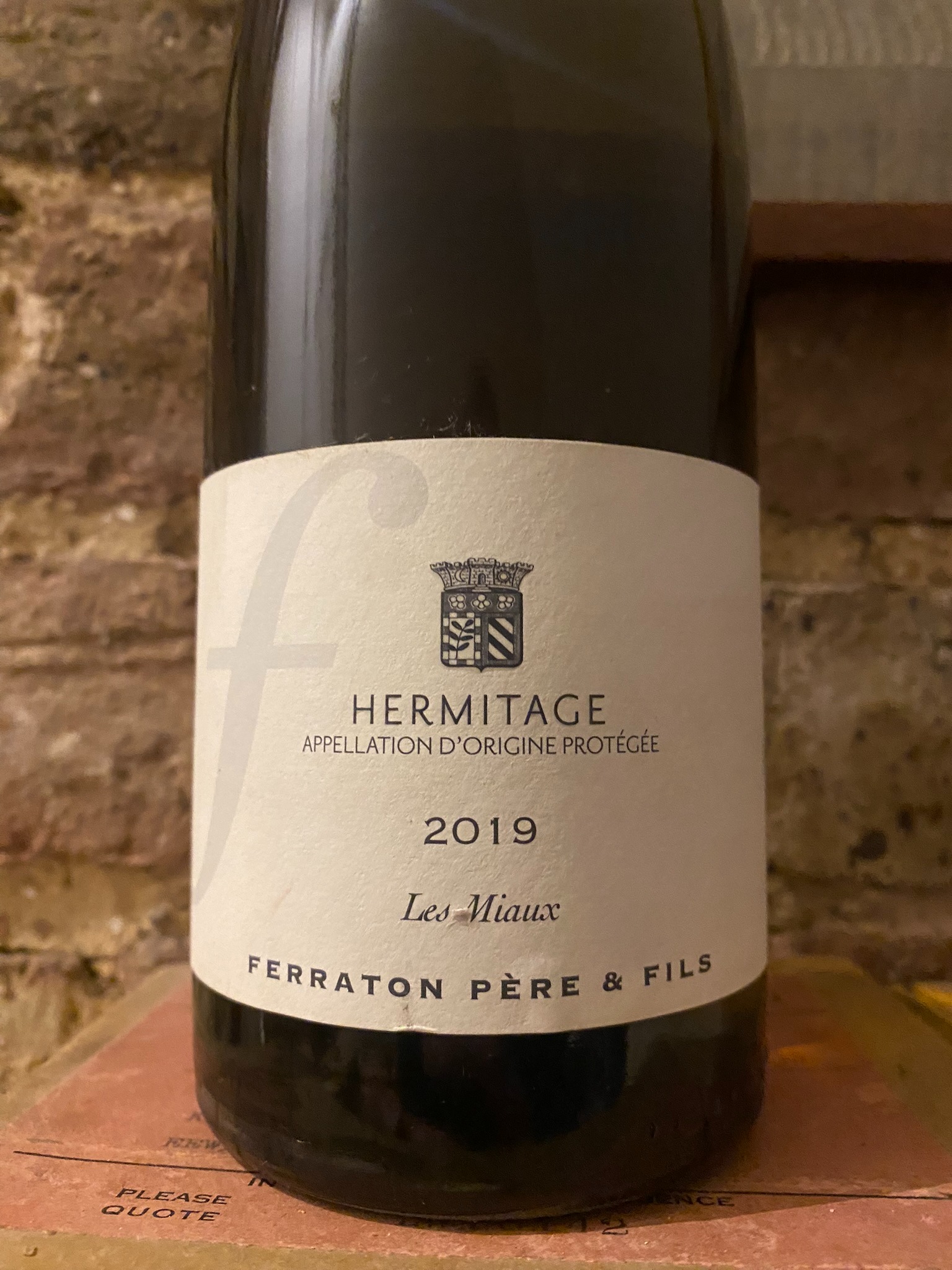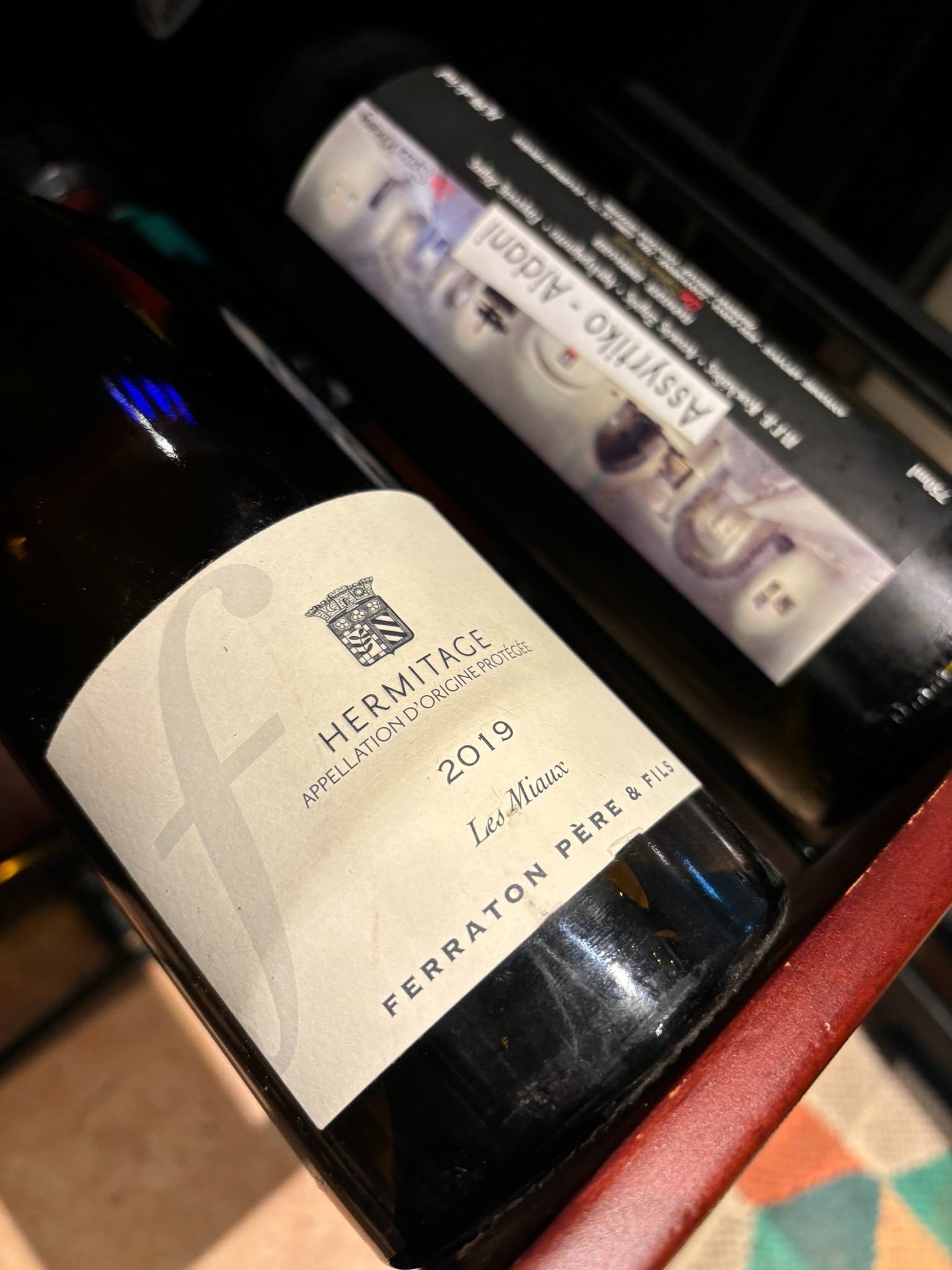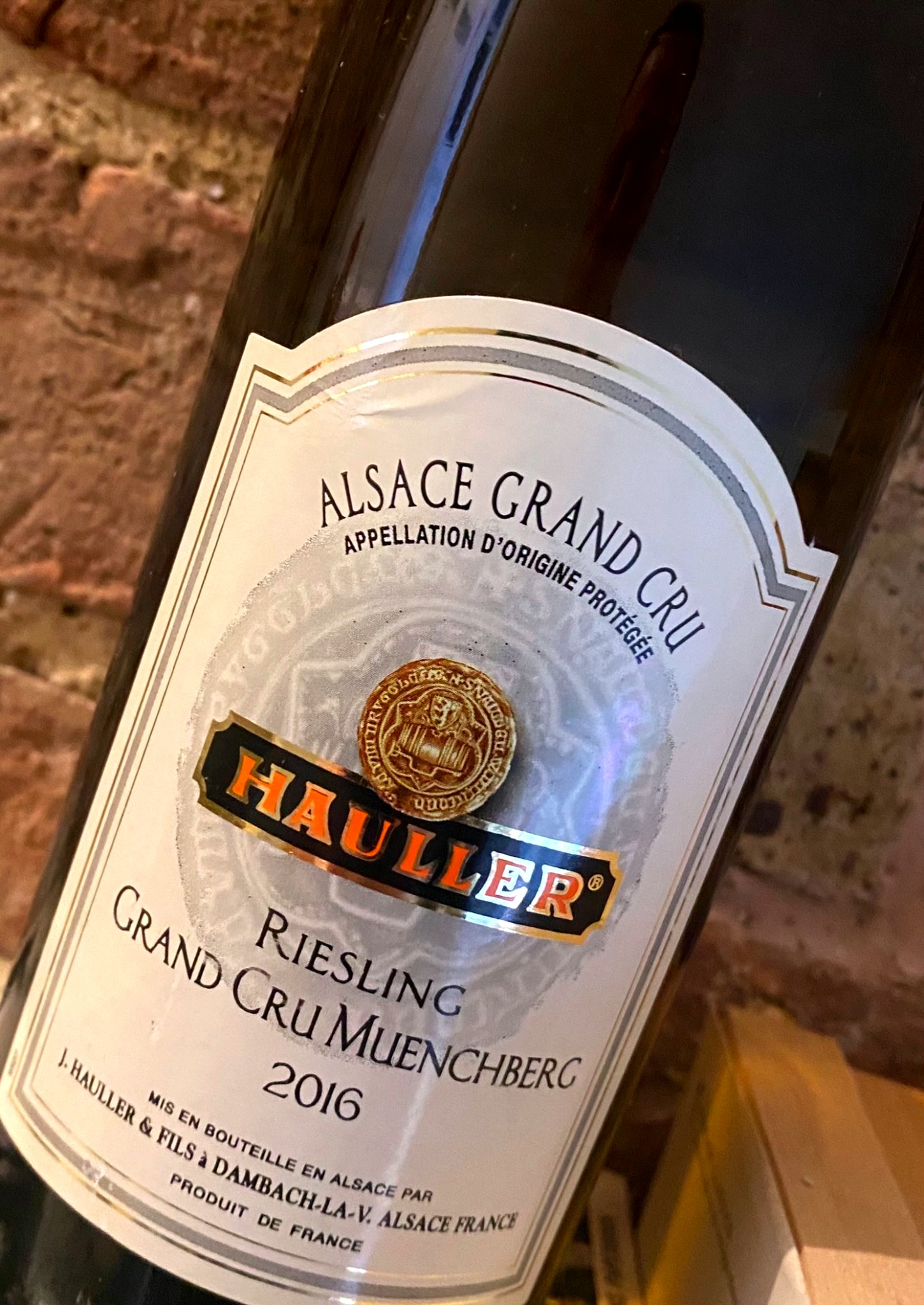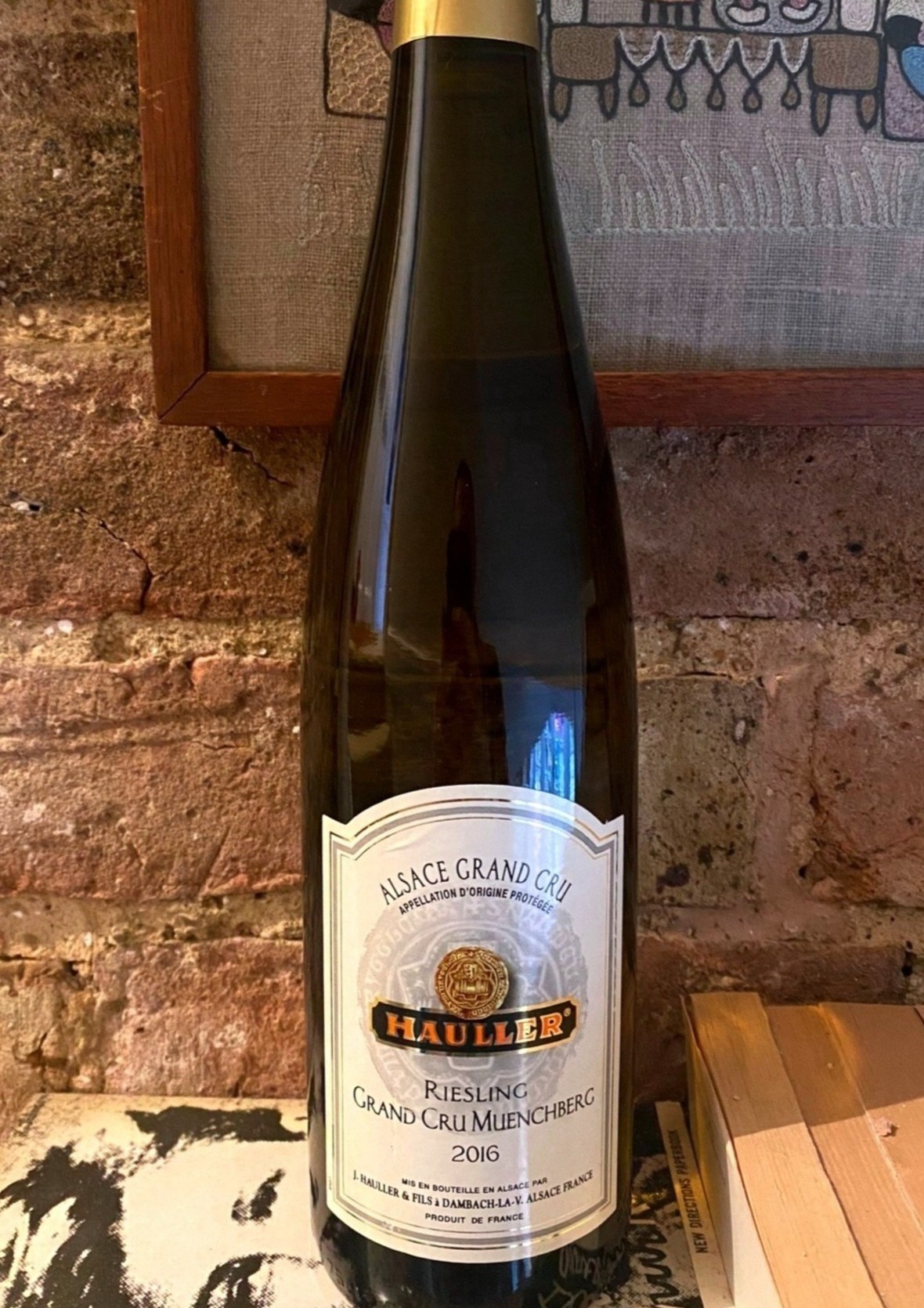French Whites
Ferraton Père & Fils Les Miaux 2019 Hermitage France
Hermitage is famous the world over for its haunting, structured reds but about a third of the total area is given over to white grapes. The appellation's white wines – usually Marsanne or Marsanne/Roussanne blends – can age, taking their fruit to deeper, more complex notes of nut and honey. I have been keeping a 2019 in my cellar for a few years now waiting for the right moment to pop the cork and see how things are developing.
The wine I had stashed away was Les Miaux from Ferraton Père & Fils, a well-regarded winery that makes wines across a number of the famous Rhône appellations: Côte Rôtie, St-Joseph and Condrieu for example, as well as reds and whites from Hermitage. A outfit with its feet firmly planted in the history of the terroir, they have in recent years been working with Michel Chapoutier one of the biggest négociant names in the region, adopting biodynamic farming practices and favouring lower-intervention winemaking.
Les Miaux is 100% Marsanne grown according to these principles and fermented with indigenous yeasts. The wine is then aged on its lees – partly in oak, partly in vat – for 10-12 months before bottling giving complexity to the aromas and adding texture and interest to the mouthfeel. It’s a beautiful, golden, honeyed colour in the glass. First impressions were of an extremely elegant nose, initially quite shy certainly compared to the fruit blockbusters from the new world. There is fruit here but it’s quiet quince and warm yellow apple together with the beginnings of a nutty, gingery softness.
The palate is bolder, opening up with honeysuckle, beeswax and a distinctive savoury, vinous quality. Flinty and salty with the fruit well to the background, there’s a smoky quality to its aromatic depth. The acidity is well integrated and just about sufficient to support the fullness of its body. The finish is on the longer side of medium and distinctly dry with a bitter tinge that belies its oily, creamy texture. It’s a serious and grown-up affair, perhaps a little austere and old-school for some tastes – including, on reflection, my own.
Good wines often have a fallow period when the fruit has receded and before sufficient tertiary aromas have developed to replace them. I think I got the timings wrong here – I just couldn’t wait long enough! Marsanne’s citrus and stone-fruit profile had definitely waned but there was, as yet, insufficient nuts and honey to replace it. I wanted more of a lilting, golden autumn and less of the closed, grumpy and begrudging spring. My mistake, I suspect. There’s still promise here, but I think the wine was asleep and waiting to really blossom. What a shame, certainly at this price!


Hauller Muenchberg Grand Cru Riesling 2016 Alsace France
The Hauller family have been making wine from their base in the village of Dambach-la-Ville in Alsace for generations. To the north of the village lies the Grand Cru of Muenchberg (or ‘monk mountain’) whose Germanic/Alsatian name reminds us of the region’s history, geography and stylistic bent (we are only about 30km from the German border, after all). Geology has its own story to tell with the local soils composed of sandstone and volcanic sediment – offering a much sought-after growing environment, nutrient-poor but with good drainage that forces the vines to concentrate all their effort into fruit production. All of which makes for a really interesting wine before you’ve even popped the cork.
Riesling is the grape of choice in this neck of the woods, thriving in these sun-drenched, south-facing slopes. And you can really sense the sunshine in this bottle. Deep lemon in colour with scintillating golden highlights, the wine glows pleasingly in the glass. The nose, in turn, offers pronounced citrus of a lovely, warm, lemon-curd inflection. It’s underpinned by a cornucopia of plump yellow fruits – apple, melon, quince and overripe pear. There’s also a fascinating sweet-sour quality of baked apples with a hint of bitter orange. Some honey, nuts and beeswax are also starting to appear, courtesy of the bottle ageing, adding depth and intrigue to the palate.
The palate is a little more restrained, dry but not austere with an underlying flinty smoke. There is some weight to the body, a little more than medium I would say, but it remains elegant. Sufficient texture and complexity hold the attention well. Charming, really. I tried the wine on a lovely warm day sitting in the garden, the perfect setting for its wonderfully refreshing character. The finish is meandering – it’s on the longer side of medium but faded somewhat and then returned nicely. As I drained my glass contentedly I noticed some tartrate crystals at bottom which I took as a good sign that the wine hadn’t been unduly stabilised before bottling. This is a lovely wine that would accompany you on a summer picnic perfectly. It would also reward a little more serious gastronomic attention too, something fragrant like Escoffier’s Sole Veronique or a lighter chicken dish.


Domaine Gramiller Plénitude 2021 Côtes du Rhône France
I first came across Domaine Gramiller through an opportune bottle of their wonderful Sol Rasteau plucked from the wine list at Brix and Bones (you can read my thoughts on the wine in my Reds list and of the restaurant in my 5 Favourite Foodie Haunts: Norwich). My wine review ended with the words “I look forward to trying more” so when I spied of bottle of Gramiller’s white Plénitude in my local indie wine shop, I didn’t hesitate.
The Domaine is located in the heart of the village of Rasteau itself, in the Vaucluse north-east of Orange. As well as a range of Grenache-heavy reds released under AOC Rasteau, the winery also makes red and white Côtes du Rhône wines plus a rosé, a petillant sparkler and a couple of other interesting blends. Plénitude is their 50% Grenache (Blanc), 40% Clairette, 10% Roussanne cuvée – three of the classic grapes of the southern Rhône that they harvest by hand and ferment in cement tanks to preserve freshness.
The wine is a clear, pale lemon in the glass. It has a very fresh lemon nose too, shaded with yellow apple and aromatic pear notes. There are subtle floral aromas as well that read more as scented melon or maybe white peaches poached in a little St. Germain rather than baskets of flowers. These aromas sit over the fruit like delicate filigree work, not obscuring but providing interest and layers. Overall, the nose is fresh and pretty rather than showy.
The palate is a little more restrained, dry but not austere with an underlying flinty smoke. There is some weight to the body, a little more than medium I would say, but it remains elegant. Sufficient texture and complexity hold the attention well. Charming, really. I tried the wine on a lovely warm day sitting in the garden, the perfect setting for its wonderfully refreshing character. The finish is meandering – it’s on the longer side of medium but faded somewhat and then returned nicely. As I drained my glass contentedly I noticed some tartrate crystals at bottom which I took as a good sign that the wine hadn’t been unduly stabilised before bottling. This is a lovely wine that would accompany you on a summer picnic perfectly. It would also reward a little more serious gastronomic attention too, something fragrant like Escoffier’s Sole Veronique or a lighter chicken dish.


